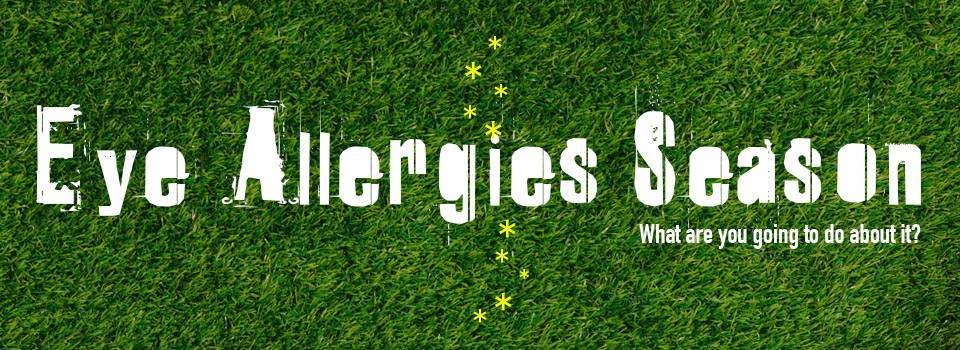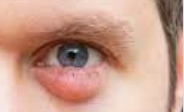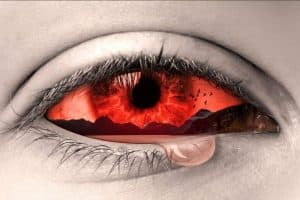Did you know that up to 25 percent of people suffer from eye allergies?
Eye allergies can develop at any time during the year, and result from a range of allergens in the environment:
- Outdoor allergens: pollens from grass, weeds, and trees
- Indoor allergens: dust mites, pet dander, and mold
- Irritants: cigarette smoke, diesel exhaust, air pollution and perfume
Eye allergy symptoms
- Itchy eyes
- Red eyes
- Burning in the eyes
- Watery eyes
- Swollen eyelids
Tips to relieve eye allergy symptoms
Many mild allergy symptoms can be alleviated with some lifestyle changes and over-the-counter (OTC) eye drops or medications.
Limit exposure to known allergens
Limiting your exposure to known allergens can significantly reduce your allergy symptoms.
- Use air conditioning. When the pollen count is high, try to stay indoors, keep your windows closed, and turn on your air conditioner. Using a fan can worsen your allergy symptoms as it can spread any indoor allergens around your home.
- Wear sunglasses. Wearing wraparound sunglasses when venturing outdoors during allergy season can significantly reduce your exposure to outdoor allergens.
- Keep dust to a minimum. Instead of dry-dusting or sweeping, clean your shelves with a wet rag and your floors with a wet mop.
- Mite-proof bedding. Use mite-proof covers and wash your bedding frequently to prevent dust accumulation and help you keep pet dander and other allergens under control.
- Control mold. Use a dehumidifier to keep the air dry and prevent mold growth during cold and rainy seasons. Treat any visible mold promptly with detergent and a five percent bleach solution.
- Wash your hands. Wash your hands thoroughly when returning home and after exposure to any known allergens.
- Avoid touching your face. While easier said than done, this tip will save you from spreading small particles of allergens around your face and near your eyes where they can enter your body and cause an allergic reaction.
If your eye allergies are severe or persistent, schedule an appointment with an eye doctor for more effective treatment options.
SEE RELATED: How to Prevent Eye Allergies
Use eye drops
Over-the-counter (OCT) eye drops can lubricate your eyes, flush out any allergens, and provide short term relief of mild eye allergy symptoms.
Artificial tears. Artificial tears eye drops, gels or ointments can be used throughout the day to moisten your eyes, soothe irritation, and wash allergens away.
Antihistamine eye drops. These eye drops can help to relieve red, swollen, itchy eyes. Antihistamine drops provide fast relief to uncomfortable allergy symptoms. Their effects tend to last only a few hours, so it is recommended to use them multiple times per day.
Decongestant eye drops. These eye drops reduce eye redness by constricting the blood vessels in the eye. They are available in two forms: decongestant only, and decongestant plus antihistamine.
Decongestant eye drops should only be used for up to three days because prolonged use can cause a rebound effect and actually worsen eye redness and swelling.
Take an oral antihistamine
If eye drops are not sufficient in treating your eye allergy symptoms, your eye doctor may recommend an oral antihistamine for further relief.
Oral antihistamines, both OTC and prescription, can help to relieve excess tearing itching associated with eye allergies. However, they can also increase dryness and further irritate your eyes.
Most eye doctors recommend using an artificial tears solution to lubricate your eyes in combination with an oral antihistamine for optimal results.
Switch from contact lenses to glasses
Try to refrain from contact lens wear during peak allergy seasons and switch to glasses instead.
Airborne allergens can accumulate on your contact lenses if they are not properly disinfected each night. This can worsen your eye allergies and prevent OTC treatments from working to relieve your symptoms.
Wearing glasses can protect your eyes from airborne allergens and may even prevent you from touching your eyes throughout the day.
If you prefer to wear contact lenses over glasses, ask your eye doctor about switching to daily disposable contact lenses. Daily contact lenses eliminate the concern of allergen accumulation because they are discarded each night and replaced with a fresh pair in the morning.
Visit your eye doctor
If you cannot seem to get relief from OTC medications and lifestyle changes, schedule an appointment with your eye doctor.
There are many other effective treatments to reduce eye allergy symptoms and alleviate your discomfort.
LEARN MORE: Guide to Eye Conditions
If your symptoms persist or worsen long after allergy season is over, schedule an appointment with an eye doctor, as this may indicate a more serious eye condition that requires a more comprehensive treatment plan.










